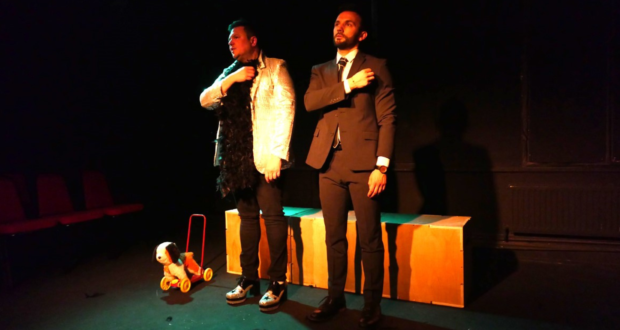The Hope Theatre
The Last Word delves into the intricacies of the relationship between two men, inviting the audience into an argument that’s been going on for decades. Summary
Rating
Good
The Last Word starts on a high as the brilliant entrance by Jack, played by Ryan Kennedy, elicits instant laughter before the play even begins. Clever costuming immediately reveals the contrasting nature of the characters’ personalities, Jack in ridiculous Elton John style platforms and a glittery blazer, compared to Sonny (Rik Grayson), dressed in a well fitting suit. A dog on wheels is also immediately introduced – another clever comedic device – inviting the audience into a childhood memory.
The play focuses on a single day, the day of the father’s funeral, where the characters are running terribly late. This allows for many conversations about life in the home where Sonny grew up, mostly consisting of infuriating arguments between the men, with the nature of their relationship unclear. Sometimes one deliberately provokes the other, who then retaliates with immediate, reactive anger. It is understood that there is a deep and complex history to this relationship, with many nuances. Numerous unsaid things throughout the years lead to anger seeping through into seemingly unrelated conversations.
The use of three wooden boxes as the only stage set is an incredibly effective way to create very distinct locations. It is immediately obvious where the characters are, despite this minimal use of props. Initially, the boxes are used more trivially, as seating for the modes of transport taken. However, later on when they are lined up diagonally a striking image of a coffin is created. When placed upright and separated, they also very clearly represent gravestones, with the shadows cast by lighting behind them reinforcing this image. Although the audience know they are at a funeral, having the pieces of set there is a stark reminder of who they are there to mourn – the difficult father. The coffin placed exactly centrestage forces the actors to move around it in an awkward, uncomfortable manner, also reflecting the obtrusive nature of the man’s presence when he was alive.
At times the conversation feels slightly stilted. Although it is clear that much is left unsaid, gaps between lines are sometimes too long. Pauses for dramatic effect are often employed successfully, yet there are some moments where the conversation feels slightly slow, with too much space. As the men bite back to hurt each other, the delivery would be better suited to quick or quippy bickering. However, the silences after a ridiculous misogynistic comment, when words cannot begin to explain how wrong what was being said was, and the characters let their faces do the talking, are incredibly funny. The audience and Sonny have a mutual understanding with one another.
Writer Lisa McMullin carefully balances the complexities of a relationship between father and son, where there is clearly much resentment but where there was once a time of fondness. Difficulties with being gay under the rule of a straight white man who doesn’t understand his own privilege, along with being an emotional child with a father unable to cope with those emotions, are understandable reasons to build up bitterness. Yet, clearly happy childhood memories are woven in between those, before Sonny was able to analyse just how he felt and was just a child admiring his father.
The Last Word is written in an insightful way that paints the relationships between people as not black and white. Although this isn’t really news to anyone, inviting an audience into the day of the father’s funeral reveals how these relationships can affect an individual. And how even after death keeping up appearances of a happy home is important, and getting in the last word even more so.
Written and directed by Lisa McMullin
The Last Word has completed its current run. Further information and bookings can be found here.
 Everything Theatre Reviews, interviews and news for theatre lovers, London and beyond
Everything Theatre Reviews, interviews and news for theatre lovers, London and beyond



